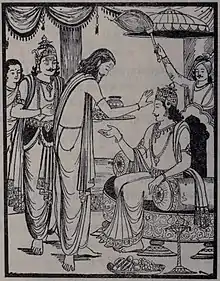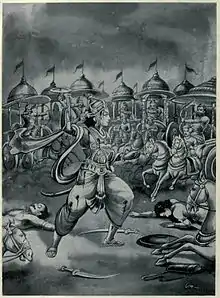Kripa
Kripa (Sanskrit: कृप, romanized: Kṛpa, lit. 'pity'), also known as Kripacharya (Sanskrit: कृपाचार्य, romanized: Kṛpācārya, lit. 'Kripa the master'), is a figure in Hindu scriptures.[1] According to the epic Mahabharata, he was a council member of Kuru Kingdom and a teacher of the Pandava and Kaurava princes.
| Kripa | |
|---|---|
 Kripacharya crowning Karna King of Anga | |
| Information | |
| Gender | Male |
| Affiliation |
|
| Weapon | Bow and arrow |
| Relatives |
|
| Home | Hastinapur (Kuru Kingdom) |
Born from the seed of the warrior-sage Sharadvan, Kripa and his sister Kripi were adopted by King Shantanu of the Kuru Kingdom.[2] Kripa was trained by his birth father and became a great archer like him. Later in the epic, he fought on the Kauravas's side against the Pandavas in the Kurukshetra war and was among the few survivors of the war.
Kripa is considered as a Chiranjivi, an immortal being destined to live until the end of the Kali Yuga, the last yuga (age). According to some texts, he will also become one of the Saptarishi—the seven revered sages—in the next Manvantara, which is a cyclic period of time in Hindu cosmology.
According to the epic Mahabharata Kripa was born with a portion from one of the eleven Rudras, whereas according to the Devi-Bhagavata Purana Kripa was the incarnation of one of the Maruts and according to many other granthas Kripa is said to be the 4th incarnation of lord Brahma on earth.
Names
The Sanskrit word Kripa (Kṛpa) means 'pity' or 'mercy'. According to the Mahabharata (c. 700 BCE – 400 CE), he and his sister were named "Kripa" and "Kripi" as they were adopted by King Shantanu out of pity.[3][4][5] Kripa was given the title "acharya" ('master') as he was an expert archer.[5]
In the epic, Kripa is known by many other names including Gautama ("descendant of Gautama"), Sharadvata ("son of Sharadvan"), Sharadvanputra ("son of Sharadvan") and Bharatacharya ("teacher of the descendants of Bharat").[6]
Birth and upbringing
According to the Adi Parva of the Mahabharata, a boy named Sharadvan was born to sage Gautama and his wife Ahalya. Contradictory to this account, some later Puranic scriptures such as the Agni Purana mention him as Gautama's great-grandson.[3][5] Sharadvan showed great passion in archery and as he matured, he became a great archer. He once did penance to become undefeatable, but this threatened the devas, especially Indra. He then sent a beautiful apsara (celestial nymph), Janapadi, from heaven to distract the celibate saint.[4][3] When Sharadvan saw her, he lost his control and ejaculated. Ashamed of his actions, he left his weapons and went deep into a forest. The semen fell on some weeds, dividing the weeds into two parts. A boy and a girl were born from the weeds.[4][5]
Shantanu—The king of Kuru Kingdom—was out hunting, when one of his soldiers spotted the twins and brought them to him. Shantanu became so compassionate towards them that he adopted them and returned to his palace. The children were then named Kripa and Kripi.[3][4] Sharadvan, who was performing tapas in the forest, learned about his children and went to Kuru's palace. He revealed their identity to the king and taught Kripa the four branches of Dhanurveda (archery). Kripa became a great archer like his father and taught warfare to many warriors and kings.[3][5] Kripa grew up to become a skillful and courageous warrior, whose bravery is compared to no one else except lord Kartikeya the son of lord Shiva and goddess Parvati and the slayer of demons. Over time Kripa became a great Brahmarshi aswell whose intelligence, wisdom and knowledge were second to none.
Life before the Kurukshetra War

The Adi Parva mentions that Kripa taught the Pandavas, Kauravas, Vrishnis and Yadavas about Dhanurveda.[5] Later, the Pandava and Kaurava princes studied under Drona, Kripi's husband who was born to Bharadvaja and apsara Ghritachi in the similar way like her. When the princes' training was over, a test was organised. Karna—the adopted son of a charioteer—challenged Arjuna in an archery match, but Kripa interfered and asked Karna to specify his lineage.[6]
The Sabha Parva of the epic narrates that Kripa participated in the Rajasuya ritual of Yudhishthira, where he distributed dakshina (fees). In the Virata Parva, Kripa helped Duryodhana, the eldest Kaurava, by sending spies to find the Pandavas during their incognito period of exile.[6]
When Hastinapur attacked Virata Kingdom in order to search for the Pandavas there and steal all the cows of that kingdom, Bhishma mentioned Kripacharya, Dronacharya and Ashwatthama as powerful Brahmakshatriyas before the war began.
Kurukshetra War and later life

In the Kurukshetra War between the Pandavas and Kauravas, Kripa supported Duryodhana and fought from his side.[5] The Udyoga Parva of the Mahabharata mentions that Bhishma, commander of the Kaurava army, declared Kripa as a mighty warrior.[7] During the war, Kripa fought with many warriors including Brihatkshetra, Chekitana, Satyaki, Sahadeva, Arjuna, Bhima, Dhrishaketu and Vardhakshremi. He also defeated warriors like Shikhandi, Dhrishtadyumna and Yudhamanyu, as well as killed Abhimanyu's guards, Suketu and Kalinda prince.
Both Kripacharya and his nephew Ashwathama always loved the Pandavas and highly sympathized them, both of them even tried their best to ensure peace between both parties. Kripacharya always used means to stop war be it duel between Arjuna and Karna or the big Kurukshetra war. Both of them openly insulted Duryodhana, Karna and Dushasana expressing disgust for their immoral and cruel acts, they called the Kauravas sinners again and again but in the end had to fight the war on behalf of those sinners only because of their loyalty towards Hastinapur and it's king Dhritarashtra.

The Shalya Parva mentions that Kripa advised Karna to make peace with the Pandavas. On the 18th day of the war, the Kauravas side was defeated and Duryodhana was killed by Bhima. During the night when the Pandavas were absent, Kripa, along with Ashwatthama and Kritavarma, raided their camp, burnt it and massacred the remaining Pandava army.[8][6][5] Before they attacking their camp Kripa tried to stop and even warned Ashwatthama that attacking the Pandava camp after sunset was against the code of warfare but Ashwatthama blinded by anger and revenge of Drona's unjust death in the battlefield ignores his uncle's warning and proceeded with his plan anyways.
The Stri Parva of the epic records Kripa returning to Dhritarashtra and Gandhari, the parents of the Kauravas, and telling them about the war.[9] In the epic's Ashramavasika Parva, when Dhritarashtra decided to retire to the forest, Kripa wanted to accompany him. However, Dhritarashtra stopped him and advised Yudhishthira, the new emperor of Kuru Kingdom, to keep Kripa in the kingdom. When the Pandavas also retired to the Himalayas after many years, Kripa became the preceptor of Parikshit, the grandson of Arjuna. It is believed that after fulfilling his duties, Kripa finally went to the forest for penance and lived the rest of his life.[6][5]
Kripa was the most neutral warrior throughout the entire Kurukshetra war and the only warrior in the war to not use a single celestial weapon on his enemies due to his impartial nature and high morals hence he was respected and trusted by the Pandavas even after helping Ashwatthama in his mission to attack the Pandavas camp at night.
Legacy
In Hinduism, Kripa, along with Ashwatthama, Bali, Vyasa, Hanuman, Vibhishana, Markandeya and Parashurama, is a Chiranjivi, the "immortals" who will remain alive till the end of the Kali Yuga, the last of the four yugas (age). According to some scriptures, Kripa was blessed with immortality due to his immense knowledge, sense of loyalty and Impartial nature.
According to the Vishnu Purana (c. 400 BCE - 900 CE), Kripa will become one of the Saptarishi—the seven most revered sages—in the next Manvantara, which is a cyclic period of time identifying the age of a Manu—the progenitor of mankind—in Hindu cosmology.[10][11]
References
Citations
- www.wisdomlib.org (28 January 2019). "Story of Kṛpa". www.wisdomlib.org. Retrieved 1 August 2022.
- Walker, Benjamin (9 April 2019). Hindu World: An Encyclopedic Survey of Hinduism. In Two Volumes. Volume I A-L. Routledge. p. 404. ISBN 978-0-429-62465-0.
- Mani 1975, p. 418.
- Ganguli 1896, Adi Parva: Sambhava Parva: Section CXXX
- Dalal 2010, p. 206.
- Mani 1975, p. 419.
- Ganguli 1896, Udyoga Parva: Uluka Dutagamana Parva: Section CLXVII
- Chakravarti 2007.
- Ganguli 1896 Stri Parva: Jalapradanika Parva: Section XI
- Wilson 1840, Chapter II
- Mani 1975, p. 485.
Sources
- Mani, Vettam (1975). Puranic encyclopaedia : a comprehensive dictionary with special reference to the epic and Puranic literature. Robarts - University of Toronto. Delhi : Motilal Banarsidass. pp. 418, 419.
- Ganguli, Kisari Mohan (1896). "The Mahabharata, Book 1-18". sacred-texts.com.
- Dalal, Roshen (2010). Hinduism: An Alphabetical Guide. Penguin UK. ISBN 978-81-8475-277-9.
- Wilson, Horace Hayman (1840). "The Vishnu Purana". sacred-texts.com.
- Chakravarti, Bishnupada (13 November 2007). Penguin Companion to the Mahabharata. Penguin UK. ISBN 978-93-5214-170-8.

